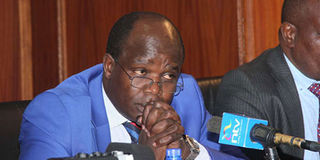Blow as court rejects Uasu drive for higher grading

Universities Academic Staff Union Secretary-General Constantine Wasonga appears before the parliamentary committee on Education at Continental House on May 23, 2018. The union has opposed the outcome of a job evaluation report by the Salaries and Remuneration Commission. PHOTO | FILE | NATION MEDIA GROUP
What you need to know:
- Dr Wasonga said the report places junior administrative staff above academic staff yet the core function of universities is training and teaching performed by lecturers.
- Justice Onyango, while dismissing the case, said lecturers were involved from the inception of the job evaluation exercise and their rights had not been violated.
Lecturers in public universities have suffered a major blow in their push to be ranked higher than administrative staff in their institutions after the Labour Court in Nairobi dismissed their case.
The Universities Academic Staff Union (Uasu) had challenged a job evaluation report by the Salaries and Remuneration Commission (SRC) released in 2017 that had graded lecturers and non-teaching staff.
The report graded a professor with a doctorate degree, the highest paid academic staff, below a university librarian.
Vice chancellors were ranked the highest at E5, deputy vice chancellors and principals of colleges were at E4, while the lowest ranked employee, a sweeper, at grade A.
CONSULTATION
The Uasu was not happy with the guidelines and move to court to challenge the policy saying members were not consulted despite being key stakeholders with an existing collective bargaining agreement (CBA).
The union claimed that their exclusion from the job evaluation process infringed on members’ rights to collective bargaining, which is guaranteed by the Constitution.
The lecturers said that they should have been consulted in the development of a tool to assess their jobs.
Uasu Secretary-General Constantine Wasonga told Justice Maureen Onyango that the core mandate of university academic staff is to train, teach, conduct research and outreach, consultancy and community service under section 3 of the University Act.
“The Paterson tool relied on the REMeasures method which grades jobs solely on the criteria of decision-making, which is not a function delegated to lecturers by law,” argued Dr Wasonga.
WEAK ARGUMENT
He said the report places junior administrative staff above academic staff yet the core function of universities is training and teaching performed by lecturers.
“SRC failed to take into account the qualifications of persons graded as more qualified members of the Uasu had been graded lower than less qualified administrative staff,” added Dr Wasonga.
However, SRC chief executive officer Anne Gitau argued that the benefits of the job evaluation included establishment of a proper basis for recruitment and selection of incoming staff, ensuring proper succession as well as mapping out training needs for an institution.
The court heard that the evaluation tool is compatible with the Patterson philosophy, which is reliable and consistent.
Justice Onyango, while dismissing the case, said lecturers were involved from the inception of the job evaluation exercise and their rights had not been violated.
“From the pleadings and submission of the parties, it is evident that SRC did involve Uasu in the job evaluation exercise. It is further evident that Uasu raised its elaborate concerns to the consultant PWC for consideration. Several meetings were held by the parties thereafter,” she ruled.





